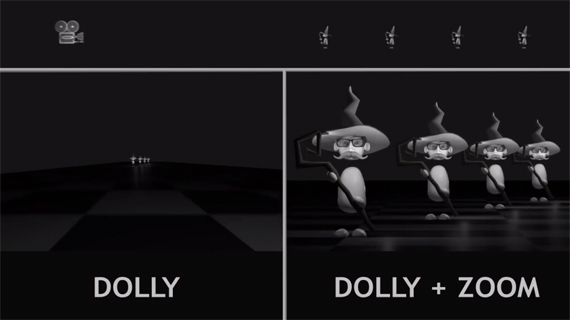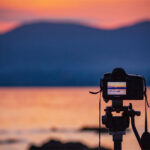Intentionally creating perspective distortion with a dolly zoom is a well-known technique, but understanding how it works is a whole other can of worms. In the video below, animator Jesse Agar explains in humorous detail what’s happening with your lens when you combine dolly motion with a zoom lens:
The dolly zoom is the technique of zooming out while you move your dolly towards the subject or vice versa. The classical effect is to keep the foreground the same size while making the background either shrink or grow large. It first originated with Alfred Hitchcock’s Vertigo, and since then has been used in everything from the music video “Thriller” to Jaws to The Lord of the Rings. And while all film students know of the technique, understanding why is often elusive, as it delves into the nature of the eye, how light bends, and the role focal length plays in framing a scene.
What does it boil down to? The fact that the closer we are to the subject, the more dramatic our shift in perspective will be.
Why? When the subject is closer to us, the narrow field of view makes the changes dramatically different. The farther away the subject(s) are, the wider the field of view and, as a result, the less obvious the changes in perspective. You can see the math below.
Just changing the the focal length via the zoom, though, won’t make a perspective change. You need to combine motion with it. When would still photographers use this? Well, not often. Timelapse photography is one of the few times still photographers use a dolly, but it would take a seriously determined and creative photographer to figure out how to do the zooming. (And of course, the question of why one would that that effect in timelapse might come up.) Stop motion photography, on the other hand, is a great candidate for some variation of the dolly zoom. To get the effect in movies, though, you need a super-smooth moving mechanical lens to make it look seamless. Photography lenses are a bit too jerky.
Most of the time filmmakers are cautioned to stay away from the effect, as it can easily come off as looking cheesy. But on those rare times that it manages to visually amplify the feelings the characters are going through during a critical story moment…that’s when it’s masterful (like in the movie Oddfellows).
What do you think? Have you ever seen it used in still photography.
Like This Article?
Don't Miss The Next One!
Join over 100,000 photographers of all experience levels who receive our free photography tips and articles to stay current:








Leave a Reply